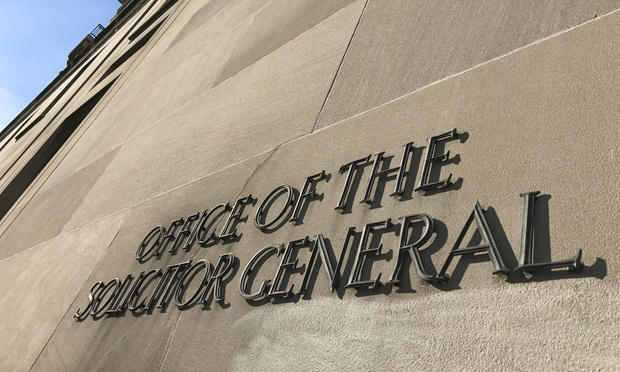Rare Alliance Between Class Action Plaintiffs, US Chamber Prevails at Supreme Court
The U.S. Supreme Court's ruling Thursday was a boost to class action plaintiffs in dispute over vitamin C. Foreign law deserves "respectful consideration," Justice Ruth Bader Ginsburg wrote, but it doesn't decide this class action.
June 14, 2018 at 01:24 PM
4 minute read
 U.S. solicitor general's office at Main Justice. Credit: Mike Scarcella/ ALM
U.S. solicitor general's office at Main Justice. Credit: Mike Scarcella/ ALM
An unusual alliance that included class action plaintiffs, the Trump administration and the U.S. Chamber of Commerce chalked up a win with the U.S. Supreme Court on Thursday in a ruling that said foreign law deserves “respectful consideration,” but should not determine the outcome of a class action.
In a terse nine-page opinion Justice Ruth Bader Ginsburg said “no single formula” will fit foreign interpretations of their own laws, “given the world's many and diverse legal systems, and the range of circumstances in which a foreign government's views may be presented.”
The unanimous decision came in the case of Animal Science Products v. Hebei Welcome Pharmaceutical, a long-running, multidistrict class action brought by American purchasers of vitamin C. They claim that Chinese manufacturers, who have cornered 60 percent of the worldwide market for the vitamin, were guilty of price- and supply-fixing in violation of American antitrust laws.
But the Chinese Ministry of Commerce countered that its export pricing is compelled by Chinese law, also claiming that the ministry has “unquestioned authority” to interpret Chinese law. The U.S. Court of Appeals for the Second Circuit agreed, stating that it was “bound to defer” to China's interpretation as a matter of comity.
 Ruth Bader Ginsburg
Ruth Bader GinsburgGinsburg disagreed: “A federal court should accord respectful consideration to a foreign government's submission, but is not bound to accord conclusive effect to the foreign government's statements.”
She also wrote that under Federal Rule of Civil Procedure 44.1, “the court may consider any relevant material or source” in evaluating foreign law interpretations. As a result, the court reversed and remanded the Second Circuit decision “for renewed consideration consistent with this opinion.”
Arguments in the case in late April included, for the first time, representation by the Chinese government. Sidley Austin partner Carter Phillips argued on behalf of China's Ministry of Commerce. He said on Thursday that “we will have another round of it in the Second Circuit.”
Boies Schiller Flexner partner Michael Gottlieb argued and won the case for the plaintiffs. The firm noted that the case was believed to be “the first plaintiff-side class action ever to attract the support of both the U.S. solicitor general and the U.S. Chamber of Commerce.”
In a statement, Gottlieb said: “For the past 12 years, we have been pursuing the truth about how four Chinese companies controlled supply and fixed prices for 80 percent of the vitamin C in the United States. We are thrilled that our effort will continue following today's unanimous decision that our case should not have been dismissed on the say-so of the Chinese government. The decision will promote free and open markets, while protecting the independence of the U.S. courts.”
Lanier Saperstein, a China specialist at Dorsey & Whitney, said Thursday that the court's “respectful consideration” standard “will generate years of follow up litigation., not only in the vitamin C case, but more broadly. The Second Circuit adopted a bright-line rule that provided a degree of certainty to litigants. The SCOTUS has now thrown a spanner in the works, creating uncertainty, leaving the lower courts to untangle and then apply the SCOTUS's nebulous standard.”
Dechert partner Michael McGinley said of the decision, “Although this outcome was expected, the decision will have a significant impact on international litigation, especially within the Second Circuit. The Supreme Court's more nuanced approach will put a premium on sophisticated counsel in cases involving questions of foreign law.”
This content has been archived. It is available through our partners, LexisNexis® and Bloomberg Law.
To view this content, please continue to their sites.
Not a Lexis Subscriber?
Subscribe Now
Not a Bloomberg Law Subscriber?
Subscribe Now
NOT FOR REPRINT
© 2025 ALM Global, LLC, All Rights Reserved. Request academic re-use from www.copyright.com. All other uses, submit a request to [email protected]. For more information visit Asset & Logo Licensing.
You Might Like
View All
Antitrust in Trump 2.0: Expect Gap Filling from State Attorneys General
6 minute read
Private Equity Giant KKR Refiles SDNY Countersuit in DOJ Premerger Filing Row
3 minute read
Skadden and Steptoe, Defending Amex GBT, Blasts Biden DOJ's Antitrust Lawsuit Over Merger Proposal
4 minute read
FTC Sues PepsiCo for Alleged Price Break to Big-Box Retailer, Incurs Holyoak's Wrath
5 minute readTrending Stories
- 1New York-Based Skadden Team Joins White & Case Group in Mexico City for Citigroup Demerger
- 2No Two Wildfires Alike: Lawyers Take Different Legal Strategies in California
- 3Poop-Themed Dog Toy OK as Parody, but Still Tarnished Jack Daniel’s Brand, Court Says
- 4Meet the New President of NY's Association of Trial Court Jurists
- 5Lawyers' Phones Are Ringing: What Should Employers Do If ICE Raids Their Business?
Who Got The Work
J. Brugh Lower of Gibbons has entered an appearance for industrial equipment supplier Devco Corporation in a pending trademark infringement lawsuit. The suit, accusing the defendant of selling knock-off Graco products, was filed Dec. 18 in New Jersey District Court by Rivkin Radler on behalf of Graco Inc. and Graco Minnesota. The case, assigned to U.S. District Judge Zahid N. Quraishi, is 3:24-cv-11294, Graco Inc. et al v. Devco Corporation.
Who Got The Work
Rebecca Maller-Stein and Kent A. Yalowitz of Arnold & Porter Kaye Scholer have entered their appearances for Hanaco Venture Capital and its executives, Lior Prosor and David Frankel, in a pending securities lawsuit. The action, filed on Dec. 24 in New York Southern District Court by Zell, Aron & Co. on behalf of Goldeneye Advisors, accuses the defendants of negligently and fraudulently managing the plaintiff's $1 million investment. The case, assigned to U.S. District Judge Vernon S. Broderick, is 1:24-cv-09918, Goldeneye Advisors, LLC v. Hanaco Venture Capital, Ltd. et al.
Who Got The Work
Attorneys from A&O Shearman has stepped in as defense counsel for Toronto-Dominion Bank and other defendants in a pending securities class action. The suit, filed Dec. 11 in New York Southern District Court by Bleichmar Fonti & Auld, accuses the defendants of concealing the bank's 'pervasive' deficiencies in regards to its compliance with the Bank Secrecy Act and the quality of its anti-money laundering controls. The case, assigned to U.S. District Judge Arun Subramanian, is 1:24-cv-09445, Gonzalez v. The Toronto-Dominion Bank et al.
Who Got The Work
Crown Castle International, a Pennsylvania company providing shared communications infrastructure, has turned to Luke D. Wolf of Gordon Rees Scully Mansukhani to fend off a pending breach-of-contract lawsuit. The court action, filed Nov. 25 in Michigan Eastern District Court by Hooper Hathaway PC on behalf of The Town Residences LLC, accuses Crown Castle of failing to transfer approximately $30,000 in utility payments from T-Mobile in breach of a roof-top lease and assignment agreement. The case, assigned to U.S. District Judge Susan K. Declercq, is 2:24-cv-13131, The Town Residences LLC v. T-Mobile US, Inc. et al.
Who Got The Work
Wilfred P. Coronato and Daniel M. Schwartz of McCarter & English have stepped in as defense counsel to Electrolux Home Products Inc. in a pending product liability lawsuit. The court action, filed Nov. 26 in New York Eastern District Court by Poulos Lopiccolo PC and Nagel Rice LLP on behalf of David Stern, alleges that the defendant's refrigerators’ drawers and shelving repeatedly break and fall apart within months after purchase. The case, assigned to U.S. District Judge Joan M. Azrack, is 2:24-cv-08204, Stern v. Electrolux Home Products, Inc.
Featured Firms
Law Offices of Gary Martin Hays & Associates, P.C.
(470) 294-1674
Law Offices of Mark E. Salomone
(857) 444-6468
Smith & Hassler
(713) 739-1250








